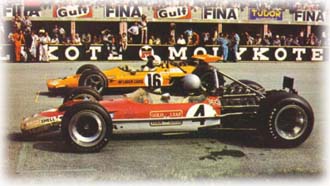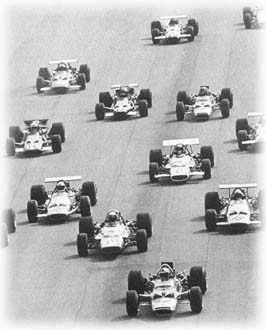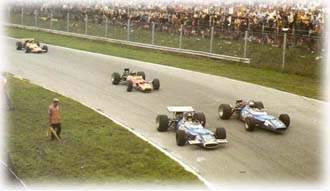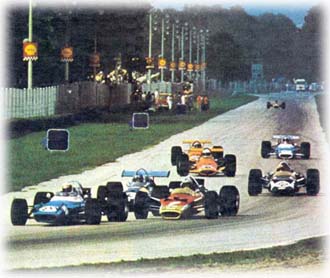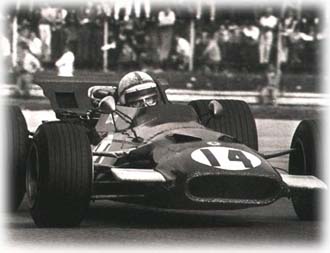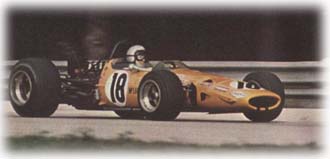| ATLAS F1 Volume 6, Issue 36 | |||
 |
A Race to Remember | ||
| by Marcel Schot, Netherlands | |||
|
Every Grand Prix Venue has its most remembered race; that race where the mighty gods of Formula One diced and dodged to achieve eternal greatness and set the record books straight. But every Grand Prix venue also has remarkable races that were pushed aside in the history books, for no good reason. Atlas F1 writer Marcel Schot reviews, ahead of every Grand Prix this season, one race which should be memorised and valued; that one round in history which makes a Race to Remember
As the grand finale of a Formula One season approaches, there's always that one theater in Italy. Monza is synonymous with Formula One in Italy, for the battle of the masters. Nowadays it's more a place where horsepower decides who wins, but in the old days, a good level of courage was just as essential. Over the years, Monza has always been the place where either the title was decided or where the real contenders separated themselves from the also rans.
Many people will remember the 1971 edition of the Italian Grand Prix as one of those legendary races. It was the fastest Grand Prix ever and it was the one with the smallest winning margin. A mere hundreth of a second separated Gethin and Peterson, while Cevert, Hailwood and Ganley crossed the line within six tenths of the winner. However, this story has been told many many times.
Before the race
With four races to go, it was not a question of if, but rather when Jackie Stewart would clinch the World Championship. The Scotsman had demostrated a dominance like only Jim Clark had done before. Of the first seven races, Stewart had won five. At the Nurburgring, Stewart had finished second to an unleashed Jackie Ickx after Stewart had lead the first half of the race, while at Monaco a mechanical failure had taken away Stewart's victory, as he had been leading comfortably from pole position until his retirement, setting the fastest lap along the way.
Coming to Monza, Stewart had 51 points. Second was Jackie Ickx, who had risen after an unlucky start to the season. The Belgian Brabham driver had 22 points. In 1969, the rules were that the best five scores from the first six races and the best four results of the last five races counted towards the championship. The first part of this rule didn't affect any scores, since no driver scored in all six races. Both Stewart and Bruce McLaren, who was third in the standings one point behind Ickx, had scored in five races, while the others had scored in four or less.
Monza has always been the home of Ferrari. However, the team was having a terrible year. For the first half of the season only one Ferrari was entered, with Chris Amon scoring just a third place at Zandvoort. In Germany, the Scuderia wasn't even present, preparing for the second half of the season after having been taken over by Fiat. So for Monza, Ferrari wanted to be back at full force for their home crowd. Sadly, things turned out much differently. After testing on Friday, Amon called it a day, leaving rookie Tino Brambilla and Pedro Rodriguez to do the job.
After the practice sessions, only one Ferrari was left. Tino Brambilla had to hand over his car to Rodriguez, who stood on the grid in the year old Ferrari in 12th place, only ahead of privateer Silvio Moser, third Lotus driver John Miles and Brabham's Jackie Ickx, who had had the worst weekend of his career so far at the worst possible time, much to the joy of Jackie Stewart, who saw his title in the bag already.
And thus fifteen cars took the grid, of which only the BRMs and the single Ferrari didn't use a Ford Cosworth engine.
The race
As the race started, Stewart, Courage and McLaren took profit from Denny Hulme's bad start, while Jochen Rindt took the lead into the first corner. However, before the first lap was over, Jackie Stewart had overtaken Rindt and the slipstreaming on the straights kept the drivers close. For the first few laps, Stewart managed to hang onto the lead. However, Lotus driver John Miles, in just his third race, had to abandon the frenzy after three laps with a blown engine in his Lotus 63, a car the regular Lotus drivers absolutely hated.
Again Stewart was the one to hold onto the lead for a while, but only just. On lap 18, Piers Courage took the lead. Even though this lasted for a short time, it was historic. Courage was leading a Grand Prix for the first time in his career, as well as it being the first time one of Frank Williams' cars had led.
A lap later Stewart was back in the lead again, with Courage, Rindt, Hulme, Beltoise and McLaren all in reach. Rindt then made his way past Courage, and the battle developed into a two way fight between Rindt and Stewart, with the others following closely behind. As it Now it appeared Stewart had more to fear from Bruce McLaren for the title than Jackie Ickx. The Belgian's Brabham didn't want to move fast at all, leaving its driver seeing the slight possibility of the title fade frustatingly away.
Around three quarter distance, Jackie Oliver became the fourth driver to retire from the race. The BRM driver, driving in the backmarkers along with his teammate Surtees, saw his oil pressure fade away. By then, Courage also had to pay the toll of having contended for the lead for so long. He steadily dropped away from the front. Stewart was pretty sure of his title by now. With 20 laps left, only McLaren was on his tail. Even if the Scotsman lost out completely in the frantic slipstreaming battle, he would still finish at least fourth, which would put him on 54 points, exactly the number Ickx would be able to score if he won the last three races, and one more than McLaren would be able to score in case he won all the remaining races.
As the race reached its climax, another three drivers retired. Jackie Ickx dropped out with no oil pressure after 61 of the 68 laps, while Graham Hill had to sideline his Lotus with a broken driveshaft two laps later. A lap later, just four laps from the end Jo Siffert also was out, with a broken piston.
About thirty seconds behind, Piers Courage was a deserving fifth place in the Williams Brabham, while Pedro Rodriguez was able to give the Italians just a little bit of what they had hoped for, finishing sixth in his Ferrari, two laps behind the leaders, ahead of seventh placed Denny Hulme. The last driver to cross the line was John Surtees, but as the former World Champion was eight laps behind, he wasn't classified.
With six wins in eight races, Stewart was the deserving champion, bringing the title to himself, Matra and Ken Tyrrell for the first time.
Conclusion
Nowadays, it is hard to remember any slipstream battles. Back in those days, the very principle of slipstreaming made the race at Monza exciting at the very least and legendary at its best. The Italian Grands Prix of 1968 through 1971 saw more lead changes than all races in the 90s combined!
After this race, the 1969 season was over. In the remaining three races, Stewart took it easy, only scoring a fourth place in the final race in Mexico. Ickx scored a controversial win in Canada after having pushed Stewart off, but that was about it. In a strange way, this Italian climax put Formula One into premature hybernation for the 1970 season, a season which would see a much closer championship and the return to form of Ferrari.
|
| Marcel Schot | © 2000 Kaizar.Com, Incorporated. |
| Send comments to: schot@atlasf1.com | Terms & Conditions |
